RIYADH: The UN envoy for Yemen arrived in Sanaa on Monday for talks aimed at persuading Iran-backed Houthi militias to quit the Red Sea port city of Hodeidah.
Martin Griffiths has been shuttling between the Yemeni capital and the cities of Aden and Muscat in Oman in efforts to find a diplomatic solution to the crisis.
The Saudi-led coalition in Yemen launched a military offensive last month to capture Hodeidah from the Houthis. They quickly seized the city’s airport and drove the Houthis out, but halted the offensive last week to avoid civilian casualties in reasidential areas of the city and to make UN-brokered peace talks easier.
The port is Yemen’s main lifeline for the import of humanitarian aid, but it is also a conduit for smuggling weapons to the Houthis, including the components of missiles launched from northern Yemen and aimed at cities in Saudi Arabia.
As pressure mounts on the Houthis to quit Hodeidah and hand it over to UN control, Yemen’s President Abed Rabbo Mansour Hadi called on them to “withdraw from state institutions and surrender their weapons.”
The Yemeni people “can no longer tolerate this absurd war,” Hadi said.
He said the goal of eradicating Iran’s dangerous expansion project was close to being achieved, and Iran’s attempts to expand its influence “threaten the present and future of Yemen and its people, who reject sectarianism and Iranian ideas executed through the Houthi militia.”
At a press conference in Riyadh, coalition spokesman Col Turki Al-Maliki produced further evidence of Iranian involvement in supplying the Houthis. He displayed photos of military supplies bearing the label of Isfahan Optics Industries.
“This proves Iranian intervention in the region, and that it is procuring weapons for the Houthis,” he said.
“The Houthis continue to destabilize normal lives for Yemeni civilians inside their own country.”
Hodeidah held the key to resolving the conflict, Al-Maliki said. With its capture by the Yemeni army backed by coalition forces “the smuggling of weapons will cease, and the mechanisms for humanitarian aid will ease.”
Al-Malki told Arab News: “We know how the UN special envoy has been working in Yemen since he was assigned. We are supporting him to come up with a political solution.
“We do believe that a political solution is the best solution for the Yemeni people. However, the Houthis are not giving any kind of concessions to sit at the table and negotiate with the legitimate Yemeni government. All efforts made by the special envoy have been rejected or refused by the militia.
“The Houthis must make concessions. The Yemeni government, when they sit with the Houthis, I would say this is the biggest concession; that you are sitting with someone who has kidnapped and taken the legitimate government.
“The Yemeni government have explained and addressed their position. They are insisting on it. They are not refusing. It’s their right to liberate Yemeni land and their right to have the return of the legitimate government.”
































